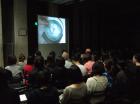JMRI run a two-hour mokume-gane lecturer for career-college students at Hiko Mizuno College of Jewelry on 29th of September. It was so popular that the original 60-seats were oversubscribed
and the class was packed with students & teachers on the day. Because of the unique opportunity to learn traditional Japanese metal technique first hand, a couple of students from abroad requested spare seats (so we heard and we were glad)!
The contents of the lecture are;


Image (left): A view of the classroom at the mokume-gane lecture (Hiko Mizuno college of Jewelry, Tokyo campus) The place was filled with ardent students and students were eagerly attentive and taking notes showing a lot of interests during the lecture. ©Japan Mokumegane Research Institute 2009
Image (right): A viewing of mokume-gane/guri-bori sword-fittings and mokume-gane art work during a break time.
©Japan Mokumegane Research Institute 2009
Voice of Participants
Here are some of the comments left by the participants
 (A)
(A)  (B)
(B)  (C)
(C)
 (D)
(D)  (E)
(E)  (F)
(F)
(A) It was a big surprise to see so many varieties of mokume-gane! I thought it was an amazing technique that allows you to represent various "expressions" by your choice of metal billet and of processing method. If given the chance, I would love to try making one.
(B) I didn't even know the word "mokume-gane" and felt ashamed as a Japanese. It made me feel like wanting to keep the beautiful legacy in Japan and letting people know about the technique. I had never been taught a history nor a background of a particular metal technique. Thank you so much for letting it happen.
(C) Hearing the talks about the history of mokume-gane, I was surprised to know there was such a wonderful technique like mokume-gane back in Edo period. Works by Takahashi-sensei, they were new design but somehow reminded me of a spirit of Wa, and I thought they were pretty amazing. It made me want to try making one. Thank you very much for today!
(D) It was interesting to see, not only contemporary mokume-gane works, but also many antique works and works by foreign artists. Simple technique it may sound, "interpose metal plates and curve", it has various applications and there is always more to learn, I thought. I would love to attend it again if there are another chances to see mokume-gane works.
(E) It was very educational, as I had never learned the structure nor a making-process of mokume-gane before. When I visited America before, I found it interesting that 木目 was translated into "mokume" as is. Thanks to the lecture today, I came to learn that it is an ancient Japanese technology with a history.
(F) I am ashamed to say that I learned to know the technique only by the lecture today. Looking at the actual mokume-gane pieces up close, I realised that they were so elaborate and very attractive indeed. Since it originates from sword-fittings, I assume there are many works aimed for men, but like Takahashi sensei, I would like to learn more and make feminine works.
The contents of the lecture are;
- Introduction: What is Mokume-Gane?
- History of Mokume-Gane
- How to make Mokume-Gane
- Mokume Works (Abroad)
- Application of mokume-gane into contemporary jewelery works (Works by Masaki Takahashi)


Image (left): A view of the classroom at the mokume-gane lecture (Hiko Mizuno college of Jewelry, Tokyo campus) The place was filled with ardent students and students were eagerly attentive and taking notes showing a lot of interests during the lecture. ©Japan Mokumegane Research Institute 2009
Image (right): A viewing of mokume-gane/guri-bori sword-fittings and mokume-gane art work during a break time.
©Japan Mokumegane Research Institute 2009
Voice of Participants
Here are some of the comments left by the participants
 (A)
(A)  (B)
(B)  (C)
(C)  (D)
(D)  (E)
(E)  (F)
(F)(A) It was a big surprise to see so many varieties of mokume-gane! I thought it was an amazing technique that allows you to represent various "expressions" by your choice of metal billet and of processing method. If given the chance, I would love to try making one.
(B) I didn't even know the word "mokume-gane" and felt ashamed as a Japanese. It made me feel like wanting to keep the beautiful legacy in Japan and letting people know about the technique. I had never been taught a history nor a background of a particular metal technique. Thank you so much for letting it happen.
(C) Hearing the talks about the history of mokume-gane, I was surprised to know there was such a wonderful technique like mokume-gane back in Edo period. Works by Takahashi-sensei, they were new design but somehow reminded me of a spirit of Wa, and I thought they were pretty amazing. It made me want to try making one. Thank you very much for today!
(D) It was interesting to see, not only contemporary mokume-gane works, but also many antique works and works by foreign artists. Simple technique it may sound, "interpose metal plates and curve", it has various applications and there is always more to learn, I thought. I would love to attend it again if there are another chances to see mokume-gane works.
(E) It was very educational, as I had never learned the structure nor a making-process of mokume-gane before. When I visited America before, I found it interesting that 木目 was translated into "mokume" as is. Thanks to the lecture today, I came to learn that it is an ancient Japanese technology with a history.
(F) I am ashamed to say that I learned to know the technique only by the lecture today. Looking at the actual mokume-gane pieces up close, I realised that they were so elaborate and very attractive indeed. Since it originates from sword-fittings, I assume there are many works aimed for men, but like Takahashi sensei, I would like to learn more and make feminine works.
